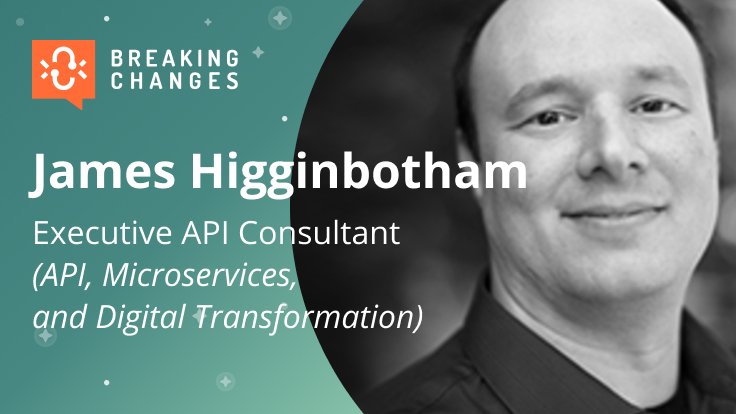“Breaking Changes” Episode 2 Recap: LaunchAny’s James Higginbotham
In episode 2 of Breaking Changes—our weekly talk show where Postman Chief Evangelist Kin Lane hosts stellar guests from all across the API universe to discuss, debate, and solve the latest topics around APIs and API-first—James Higginbotham shares his expertise. This episode is titled “Calibrating Your ‘API Compass’ as Part of Your API Strategy.”
As an executive API consultant with experience in API strategy, software architecture, and training teams in API and microservice design, James is the founder of LaunchAny, a consultancy focused on leading enterprises and SaaS companies through their digital transformation journey. His approach helps companies bridge business and technology to deliver the best customer experience.
With APIs holding incredible value for enterprises when they’re implemented with a coherent strategy and holistic approach, James talks about what it means to deliver an API program from a business perspective (he provides strategy and metrics) as well as technical side (he gives advice on processes, standards, and patterns).
You can tune in and subscribe to the Breaking Changes podcast on Spotify, Apple Podcast, Google Podcast, and Amazon music, or watch it on Youtube.
Episode topics
- What does API governance mean today?
- Why do so many organizations fail at documentation?
- How do you measure the success of the APIs?
Episode highlights
Here are just some of the helpful insights James shares during the lively discussion.
Creating effective APIs is a journey:
- It’s not just about simply creating and releasing an API or adopting an external API and hoping for the best. James discusses three key things necessary to manage APIs on a continuous basis: a shift in mindset, a sense of API ownership, and an appreciation for documentation.
Diving deeper into API governance:
- Kin and James dig into the first thing an enterprise organization can do to have the most meaningful impact when it comes to APIs. James talks in depth about the “API strategy compass” pointing to eight disciplines:
- Strategy and culture: Is the API strategy clear, articulated, and driving growth?
- Process and governance : Are decisions related to the API program executed consistently across the organization?
- Portfolio and products: Are all digital assets organized into a digital portfolio and aligned with business needs?
- Discovery and documentation: Are the APIs discoverable and well-documented?
- Onboarding and adoption: Do APIs enable low-friction onboarding and integration support?
- Design and delivery: Are APIs consistently designed and delivered?
- Management and analytics: Are APIs owned, managed, and continually improved?
- Security and ops: Do all APIs incorporate security by default and properly address operational concerns?
Why so many organizations fail at documentation:
- According to James,“We’ve either assumed that the developer is going to be around forever and we’re not going to lose that knowledge of how the software works or we’ve confused code and documentation.” To solve this, James explains a process called “align, define, design.”
How to measure the success of your APIs:
- James asserts that API success metrics should be aligned with the business outcome expected from the APIs. The metrics could be anything from the number of successful transactions to the number of “400 error” messages and everything in between. He also talks about the secondary metrics that will help in tuning the operations of an organization’s API portfolio.
Watch the full episode
Previous episode:
- “Transforming Business through APIs” with Shutterstock VP/GM of Platform Solutions Alex Reynolds
Sign up for exclusive content
Kin will be sharing exclusive Breaking Changes content with the show’s subscribers, including hand-picked moments spanning helpful perspectives, industry news, and behind-the-scenes stories. Stay in the know by subscribing here.

What do you think about this topic? Tell us in a comment below.